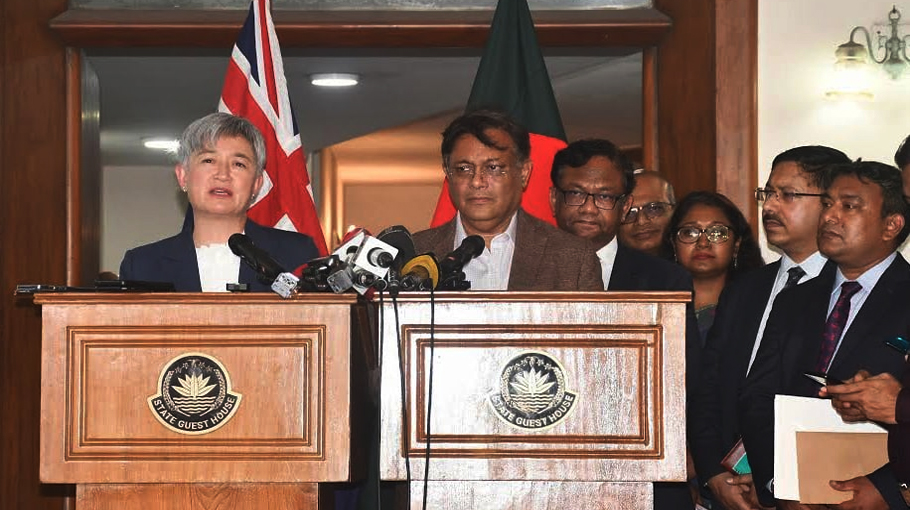Dhaka, Canberra hail growing strategic depth, dimensions in ties

Bangladesh and Australia are committed to working together to find out practical solutions to the shared contemporary challenges, including maritime security threats, climate change and cybercrimes and countering trafficking in persons.
Both the countries also appreciated the growing strategic depth and dimensions of the bilateral relations between Dhaka and Canberra.
These were observed at the bilateral meeting with Bangladesh foreign minister Dr Hasan Mahmud and his Australian counterpart Penny Wong that held on Tuesday in Dhaka, according to a joint statement issued here today.
During the meeting, the Ministers acknowledged the importance of building regional health security, promoting demographic resilience, enhancing multi-modal connectivity, and strengthening clean energy supply chains.
They agreed on the importance of promoting open channels of communication and confidence-building measures to reduce the risk of conflict in the region.
The Ministers noted the warm bilateral relationship founded on more than fifty years of diplomatic relations and deepening friendship between our peoples.
They also recognised that the high-level visits at the political level can help to take the relationship to further new heights.
The Ministers affirmed their intention to enhance cooperation on deepening two-way trade and economic ties as Bangladesh progresses towards graduation from UN LDC status, with Australia committing to maintain tariff-free, quota-free access to its market to support Bangladesh’s smooth transition.
The Bangladesh Minister provided assurances that necessary support would be given to Australian investors, including in thrust sectors like agro-processing, ICT and logistics.
The Ministers noted Australia’s ongoing funding for multilateral development banks to support Bangladesh’s efforts to address its priority structural reforms that would bolster development and economic growth. The Ministers stressed the need for strengthening the international financial architecture.
Noting the importance of enhanced connectivity to increase regional economic integration and growth, the Ministers discussed Australian technical support in partnership with the World Bank and International Finance Corporation to the connectivity measures via South Asia Regional Infrastructure Connectivity programme.
They also agreed to work further on bilateral air connectivity and cable connectivity resilience.
They noted the commonalities between Bangladesh’s Indo-Pacific Outlook, the Indian Ocean Rim Association’s Indo-Pacific Outlook and the ASEAN Outlook on the Indo-Pacific. They reaffirmed their shared vision and desire to work towards a region that is peaceful, stable, prosperous, inclusive and free from intimidation, interference and coercion.
The Ministers reaffirmed their support for sovereignty and territorial integrity in the Indo-Pacific, democratic values, human rights, freedom of navigation and over flight and the peaceful resolution of disputes.
Australia and Bangladesh are committed to working together to find practical solutions to shared contemporary challenges, including maritime security threats, climate change, cybercrimes and countering trafficking in persons.
They reiterated their shared concern about the dire humanitarian situation in Gaza, which has been exacerbated following the 7 October attacks, calling for an immediate humanitarian ceasefire and reaffirming support for a two-state solution.
The Ministers also expressed serious concern over the ongoing war in Ukraine and its repercussions around the world.
They reiterated the call for a peace process through dialogue and diplomacy with respect for the sovereignty and territorial integrity of Ukraine within its internationally recognised borders and in accordance with the principles of the UN Charter.
The Ministers expressed their deep concern at the deteriorating conflict situation in Myanmar and its effect on regional security and stability, calling for scaling up of efforts by ASEAN and other key regional actors.
The Ministers acknowledged the importance of skills development and training to foster inclusive economic growth, with Australia announcing AUD 3 million in support for delivery of technical and vocational training for Bangladesh’s youth.
The Bangladesh Minister expressed interest in enhancing cooperation with Australia in the fields of research and innovation. The Ministers affirmed Australia’s long-standing commitment in building of capacity in Bangladesh, with over 3,000 Bangladeshis having completed studies under the Australia Awards Scholarships and Fellowship Programme since 1982.
Working with the UNDP, Australia has provided technical assistance and policy support towards developing a strategy for inclusive social security system.
Australia and Bangladesh reaffirmed the vital importance of gender equality and women’s empowerment in all fields, notably across education, government and parliamentary representation.
Australia reaffirmed its support for investments to promote women’s economic empowerment. Recognising gender equality as a shared priority with opportunities for regional leadership, the Ministers agreed to work bilaterally and multilaterally to combat all forms of discrimination and violence against women and girls.
The Ministers agreed on the importance of enhanced cooperation on climate change, including funding of vital climate adaptation and mitigation measures.
Australia emphasised its partnership with Bangladesh to support agricultural production and adaptation of research, including through the work of the Australian Centre for International Agricultural Research.
They discussed enhancing cooperation on capacity building for accessing international climate financing.
Bangladesh welcomed the forthcoming visit by Australia’s Ambassador for Climate Change, and offered to share some of its locally-led adaptation solutions with the Pacific Island countries, including through trilateral engagement with Australia.
Australia acknowledged the generosity of the Bangladesh government and people in hosting the forcibly displaced Rohingyas from Myanmar while Bangladesh acknowledged the sustained humanitarian contribution of the Australian Government to support the Rohingyas and host communities in Bangladesh.
Both Ministers underlined the importance of working towards the Rohingyas’ safe and dignified repatriation to Myanmar.
The Ministers confirmed their commitment to enhancing maritime and oceans capabilities as a critical means to protecting our marine environment and promoting sovereignty and the rule of law.
The Ministers agreed to strengthen cooperation to combat people’s smuggling and transnational crimes across the region, including through prioritising cooperation between their coast guards.
They agreed to support regional and international efforts towards combating transnational organised crimes in the Indo-Pacific through both normative and practical actions.
As founding members of the Bali Process on People Smuggling, Trafficking in Persons and Related Transnational Crime, Australia and Bangladesh expressed concern about the loss of life and exploitation of vulnerable people such as the Rohingyas, including women and children, at the hands of transnational criminal networks.




